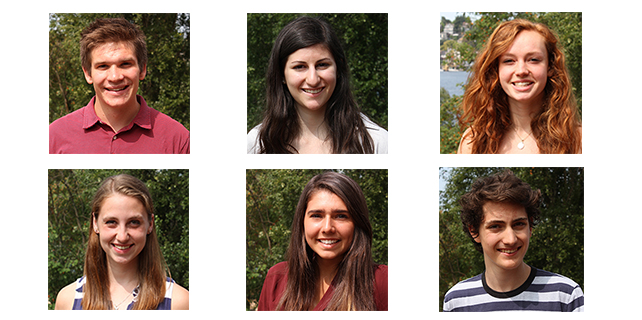The internship is part of I-LABS' outreach mission, which encompasses disseminating the latest science to a wide range of audiences and cultivating professional development in early-career scientists.
"I think of the I-LABS internship as a soup-to-nuts science experience, where students who are contemplating a career in science get an up-close view of what science entails," said Sarah Roseberry Lytle, I-LABS Director of Outreach.
The Summer 2015 interns are:
Patrick Donnelly, Tufts University, Class of 2014
Sara Federman, Mercer Island High School, Class of 2016
Kathleen Malloch, Harvard University, Class of 2018
Grace Noah, University of Washington, Class of 2016
Jenna Shamseldin, University of Washington, Class of 2018
Sam Wolf, Trinity High School (New York City), Class of 2017

Photo caption: The summer 2015 I-LABS interns, top row, left to right: Patrick Donnelly, Sara Federman and Kathleen Malloch; bottom row, left to right: Grace Noah, Jenna Shamseldin and Sam Wolf.
Their interests include early learning, child development and neuroscience, and they came to the Institute to get a closer look of science in action.
Amelia Bachleda and Lily Shafer, on the I-LABS Outreach team, designed a 4-week curriculum that combines shadowing researchers and showing the interns the breadth of methodologies used at I-LABS. The interns will have the opportunity to learn about behavioral testing and brain-imaging techniques such as the MEG, as well as learning how to process raw data and interpret results.
They'll also get hands-on experience with Outreach activities, including Institute's museum exhibits and public tours, the I-LABS training modules for early childhood educators and caregivers, and other training in scientific communication.
And the interns will have the chance to experience the process of science, including how to critically read a scientific paper, "talk shop" with other scientists, plan a research experiment, and more.
Bachleda, an I-LABS outreach specialist, has previously created similar curricula for the Smithsonian Institution.
"We developed our lesson plans with an eye for what we as scientists know to be absolutely critical skills to have in our field, while also showcasing I-LABS expertise," Bachleda said.
She's looking forward to sharing an extensive overview of I-LABS research with the interns.
"The scientists here have such an incredibly diverse body of knowledge, from studying the structure of the developing brain, to watching an infant behave, to tracing the root of those behaviors to brain activation," Bachleda said.
"Over the month of July, the interns will have the opportunity to not only see the process of research unfold, but also come away with a deeper understanding of how we, as humans, grow and develop," she added.
###